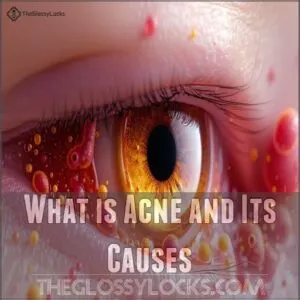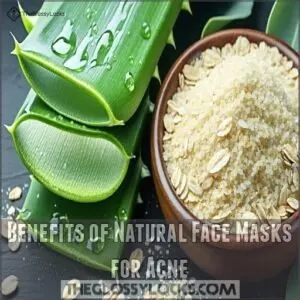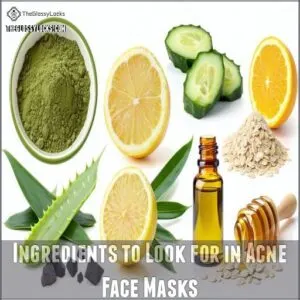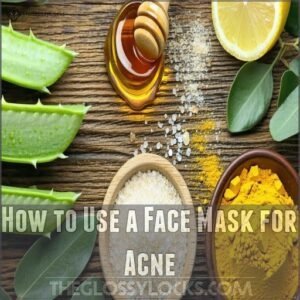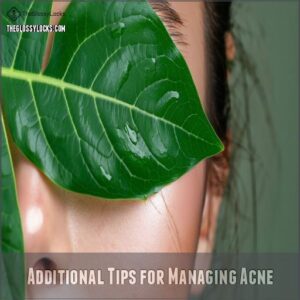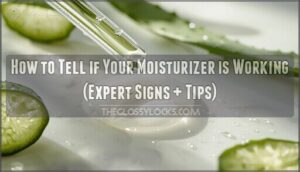This site is supported by our readers. We may earn a commission, at no cost to you, if you purchase through links.
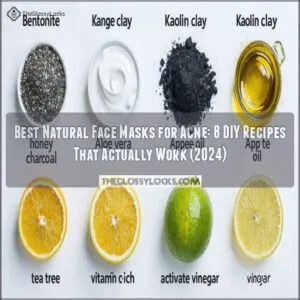 The best natural face masks for acne tackle oil, bacteria, and redness without harsh chemicals.
The best natural face masks for acne tackle oil, bacteria, and redness without harsh chemicals.
Bentonite or kaolin clay pulls out excess oil and clears clogged pores, while activated charcoal detoxifies oily skin.
Honey is a rockstar for healing thanks to its antibacterial and soothing properties—bonus: it smells amazing! Aloe vera hydrates and calms irritation, ideal for inflamed breakouts.
Add tea tree oil to fight bacteria or a splash of apple cider vinegar to balance your skin’s pH.
Want smoother, brighter skin? Look for masks with vitamin C. Using these ingredients regularly can help you outsmart acne, one mask at a time. acne
Table Of Contents
- Key Takeaways
- What is Acne and Its Causes
- Benefits of Natural Face Masks for Acne
- Ingredients to Look for in Acne Face Masks
- Top 8 Best Natural Face Masks for Acne
- 1. Nates Organic Raw Honey Squeeze Bottle
- 2. Bentonite Clay Detox Mask For Face Body
- 3. NewRhythm Probiotics 50 Billion CFU
- 4. Bragg Organic Apple Cider Vinegar 2 Pack
- 5. Majestic Pure Aloe Vera Gel 16oz
- 6. NOW Tea Tree Essential Oil 100 Pure
- 7. Organic Jojoba Oil Moisturizing Face Hair Body
- 8. YS Eco Bee Farms Raw Honey 22oz
- How to Use a Face Mask for Acne
- Additional Tips for Managing Acne
- Frequently Asked Questions (FAQs)
- Does a natural face mask work for acne?
- What is a good DIY face mask for acne?
- Can oatmeal be used in homemade acne face masks?
- What is the best homemade face mask for pimples?
- What is a good face mask for oily skin?
- What are some alternatives to acne face masks?
- What homemade face mask is best for acne?
- Which face mask is the best for acne?
- What is the best natural mask for the face?
- Which Korean face mask is best for acne?
- Conclusion
Key Takeaways
- You’ll find that face masks with natural ingredients like honey, clay, and tea tree oil effectively fight acne by absorbing excess oil, killing bacteria, and reducing inflammation.
- Stick to a consistent skincare routine; use face masks 2-3 times a week for oily skin or 1-2 times for sensitive skin, and avoid overdoing it to prevent irritation.
- Pick masks matching your skin type—choose hydrating ingredients like aloe vera for dry skin or oil-controlling options such as charcoal or bentonite clay for oily skin.
- DIY face masks combining simple ingredients like honey, yogurt, turmeric, or oatmeal soothe skin, clear clogged pores, and tackle stubborn acne scars effectively.
What is Acne and Its Causes
If you’ve ever wondered why those pesky red bumps keep showing up on your face, you’re dealing with acne – a common skin condition that occurs when your oil glands produce too much sebum and trap bacteria in your pores.
Your acne breakouts can get worse from things you mightn’t expect, like touching your face too often, environmental pollutants, and even stress.
Excess Sebum Production and Bacteria
Your skin’s got a drama queen called sebum – it’s that natural oil that sometimes goes into overdrive, turning your face into an oil slick. When excess sebum production meets acne-causing bacteria, they team up to create the perfect storm for breakouts.
Hormonal fluctuations, such as those experienced during puberty, pregnancy, and menstruation, can also trigger excess oil production.
- Overactive oil glands pump out 2-3 times more sebum than needed, clogging your pores
- P. acnes bacteria feast on this extra oil, multiplying rapidly
- The combo triggers inflammation, leading to those dreaded pimples
Environmental Pollutants and Poor Hygiene
Beyond excess oil, environmental pollutants and dirt can wreak havoc on your skin.
When pollution particles settle on your face throughout the day, they mix with sweat and natural oils, creating a perfect breeding ground for acne-causing bacteria.
Poor hygiene habits, like touching your face or skipping your skincare routine, make matters worse by trapping these pollutants against your skin, triggering more breakouts.
Benefits of Natural Face Masks for Acne
You’ll love how natural face masks can absorb excess oil, fight bacteria, and calm irritated skin without harsh chemicals that might make your acne worse.
These gentle yet powerful treatments also help prevent future breakouts.
They gradually fade those stubborn acne scars, making them a perfect addition to your skincare routine.
Absorbing Excess Oil and Reducing Inflammation
Through natural face masks, you’ll gain control over those tricky oil control methods and tackle inflammation triggers head-on.
When clay or charcoal-based mask ingredients bind with excess oil secretion, they work like tiny magnets, drawing out impurities while calming angry spots.
DIY mask recipes combining ingredients like honey and aloe vera deliver a one-two punch: absorbing shine and reducing redness for oily skin sufferers. Natural face masks offer oil control and reduce inflammation.
Preventing Breakouts and Balancing Skin PH
Regular face masks for acne work wonders in preventing those frustrating breakouts before they start.
Maintaining the right pH balance is essential for acne-prone skin; it’s like finding that sweet spot where your skin just behaves.
Natural masks help regulate oil production while gentle cleansers keep your skin’s pH in check. The key is consistency – use your mask 2-3 times weekly within your skincare routine. Regular face masks and pH balance are crucial for acne prevention.
Treating Acne Scars and Hyperpigmentation
Natural face masks do double duty regarding acne scars and dark spots.
While they work on current breakouts, ingredients like vitamin C and turmeric tackle those stubborn marks from past pimples.
You’ll find that DIY mask recipes combining honey, aloe vera, and lemon juice can gradually fade hyperpigmentation. Plus, masks with natural exfoliants help smooth out uneven texture, making those old acne battlegrounds less noticeable. DIY mask recipes and natural exfoliants are key.
Ingredients to Look for in Acne Face Masks
You’ll find that the right ingredients in your acne face mask can make the difference between just covering up breakouts and actually treating them.
Whether you’re dealing with oily skin or stubborn acne scars, natural powerhouses like clay, charcoal, and vitamin C work together to absorb excess oil, clear your pores, and help your skin heal.
Bentonite and Kaolin Clay
Clay masks have earned their spot as acne-fighting champions, with bentonite and kaolin leading the pack. Here’s why these powerhouse ingredients deserve a place in your skincare routine:
- Bentonite clay acts like a magnet, pulling out deep-seated impurities and excess oil
- Kaolin clay gently exfoliates dead skin cells while being kind to sensitive skin
- Both clays help balance your skin’s pH levels naturally
- These minerals reduce inflammation and shrink pore size over time
Activated Charcoal and Tea Tree Oil
Thanks to their powerful purifying properties, activated charcoal and tea tree oil work wonders in DIY mask recipes for acne-prone skin. When combined, they create a dynamic duo that tackles breakouts head-on.
| Ingredient | Benefits | Best For |
|---|---|---|
| Activated Charcoal | Draws out toxins | Oily skin |
| Tea Tree Oil | Kills bacteria | Active breakouts |
| Combined Use | Deep cleansing | Stubborn acne |
Mix one teaspoon of activated charcoal powder with three drops of tea tree oil for a potent acne-fighting mask that helps clear pores and reduce inflammation.
Vitamin C and Hyaluronic Acid
While charcoal and tea tree oil tackle surface issues,
vitamin C and hyaluronic acid work their magic from within. Vitamin C brightens your skin and fades those stubborn acne scars, while hyaluronic acid keeps your skin plump and hydrated without clogging pores.
You’ll often find these power players combined in face masks because they complement each other perfectly – vitamin C fights damage while hyaluronic acid maintains your skin’s moisture balance.
Top 8 Best Natural Face Masks for Acne
You’ll find that these eight natural face masks can work wonders on stubborn acne without the harsh chemicals found in store-bought products.
Whether you’re dealing with occasional breakouts or persistent acne, these proven ingredients like honey, clay, and tea tree oil will help clear your skin.
keeping your wallet happy.
1. Nates Organic Raw Honey Squeeze Bottle
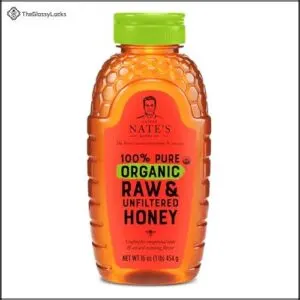
Nature’s sweetest secret for clear skin lies in raw honey, and Nature Nate’s Organic Raw Honey Squeeze Bottle stands out as a powerhouse acne fighter.
This USDA-certified organic honey packs antibacterial properties that help kill acne-causing bacteria while maintaining your skin’s moisture balance.
Its thick consistency makes it perfect for mask applications – just spread a thin layer on clean skin and let it sit for 15 minutes.
Users report improved skin texture and reduced inflammation, though you’ll want to patch test first since honey can occasionally trigger allergic reactions.
Best For: Individuals seeking a high-quality, all-natural honey for culinary use, skincare, or those looking to potentially improve insulin resistance.
- USDA-certified organic and raw, ensuring purity.
- Thick consistency ideal for masks and spreading.
- Positive user reviews highlighting taste and potential health benefits.
- Price may be considered average compared to some brands.
- Taste variations and unknown origin may concern some consumers.
- One negative review raises concerns about potential processing inconsistencies.
2. Bentonite Clay Detox Mask For Face Body
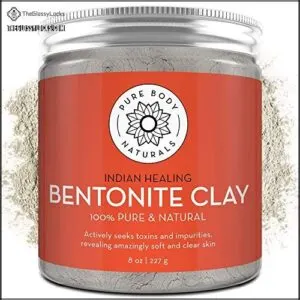
When you’re battling stubborn acne, Pure Body Naturals’ Bentonite Clay Mask becomes your skin’s best friend.
This 8-ounce powerhouse, sourced from Wyoming’s mineral-rich deposits, works like a vacuum for your pores.
Just mix the pure sodium bentonite clay with distilled water or apple cider vinegar – but skip the metal containers, they’ll mess with the clay’s properties.
You’ll notice it pulling out toxins, shrinking pores, and calming irritated skin.
Pro tip: A little goes a long way, and that temporary redness? It’s just the detox working its magic.
Best For: Individuals with acne, oily skin, or those seeking a natural detoxifying facial treatment.
- Deeply cleanses and detoxifies the skin.
- Effectively shrinks pores and reduces the appearance of blackheads.
- All-natural, free of harsh chemicals and artificial ingredients.
- May cause temporary redness or irritation.
- Requires careful mixing to avoid clumping.
- Can be messy to use.
3. NewRhythm Probiotics 50 Billion CFU
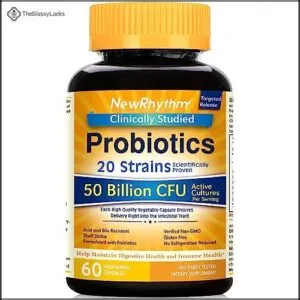
For those battling stubborn acne, NewRhythm Probiotics offers a unique inside-out approach.
Made in a GMP-certified facility in New York, these capsules pack 50 billion CFU and 20 probiotic strains to support your gut-skin connection.
Users report significant improvements in their skin after addressing digestive issues, thanks to the targeted release technology that guarantees probiotics reach your intestines.
The shelf-stable formula doesn’t need refrigeration, and it’s free from common allergens.
Just remember to start slow – some users needed to adjust their dosage for best results.
Best For: Individuals seeking digestive and immune support, particularly those with chronic constipation or looking to improve gut health for better skin.
- High CFU count (50 billion) and diverse strain blend for comprehensive gut support.
- Targeted release technology ensures probiotics reach the intestines effectively.
- Convenient shelf-stable formula with no refrigeration needed.
- Some users experienced side effects like excessive gas, bowel urgency, or loose stools, potentially related to the prebiotic blend.
- Dosage adjustment may be necessary depending on individual tolerance.
- Individual results may vary.
4. Bragg Organic Apple Cider Vinegar 2 Pack
Bragg’s organic apple cider vinegar isn’t just for your morning detox drink – it’s a powerhouse ingredient for fighting acne.
Find more products like this Bragg ACV face mask that can help you create a natural skincare routine.
This USDA-certified organic, raw ACV contains the "mother" (those cloudy strands you see around), packed with natural enzymes that help balance your skin’s pH.
Mix two tablespoons with clay or honey for a purifying mask that helps clear breakouts.
While some folks aren’t fans of the plastic packaging, the quality inside makes up for it.
Just do a patch test first – ACV can be strong!
Best For: People looking for a high-quality, versatile organic apple cider vinegar for both internal health benefits and external skincare applications.
- USDA certified organic and packed with beneficial enzymes.
- Versatile uses, including as a drink, salad dressing, and skincare ingredient.
- Good value for money due to the two-pack offering.
- Plastic bottle packaging (some prefer glass).
- Reports of receiving counterfeit products.
- Some customers felt the bottles were smaller than expected.
5. Majestic Pure Aloe Vera Gel 16oz
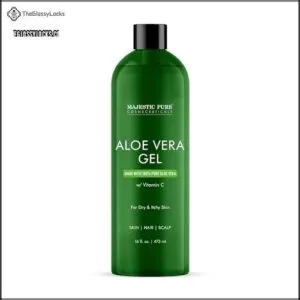
Majestic Pure’s Aloe Vera Gel is your go-to natural solution for acne-prone skin.
This USA-made, 16oz gel contains pure aloe without artificial additives, making it perfect for DIY face masks.
While its watery consistency might surprise you, it absorbs quickly and leaves minimal residue.
Mix it with honey for extra hydration, or combine it with tea tree oil for antibacterial benefits.
Users rave about its soothing properties for acne, eczema, and sunburns. Just remember to do a patch test first, as some folks report mild sensitivity.
Best For: People with sensitive skin, acne, sunburns, eczema, or other skin irritations seeking a soothing, natural aloe vera gel.
- Soothes and hydrates various skin conditions.
- Absorbs quickly and leaves minimal residue.
- Versatile; can be used in DIY skincare and hair care.
- Watery consistency may lead to spillage.
- Some users reported leakage from the bottle.
- May have a slight change in smell after opening.
6. NOW Tea Tree Essential Oil 100 Pure
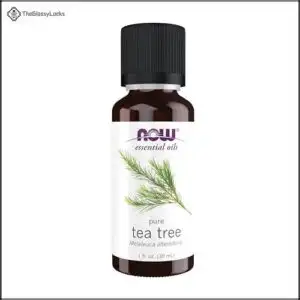
The power of tea tree oil lies in its versatility for acne-prone skin.
This 100% pure essential oil packs a punch with its antibacterial and antifungal properties, making it perfect for DIY face masks.
You’ll need to dilute it first – mix 2-3 drops with a carrier oil or aloe vera gel to avoid irritation.
While its medicinal scent might take some getting used to, the results speak for themselves. Regular users report improvements in dark spots, pimples, and overall skin clarity within weeks of consistent use.
Best For: Individuals seeking a versatile, potent, and cost-effective 100% pure tea tree essential oil for skincare, cleaning, and pest control.
- Effective against acne, dark spots, and other skin imperfections.
- Multi-purpose uses for cleaning, pest control, and aromatherapy.
- Cost-effective compared to other brands.
- Strong, potentially overwhelming scent.
- May cause skin irritation if used undiluted.
- Some users report a less potent scent compared to other brands.
7. Organic Jojoba Oil Moisturizing Face Hair Body
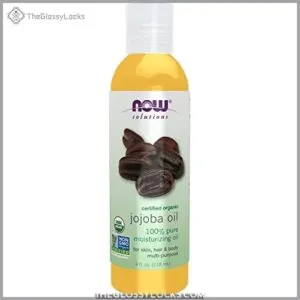
Using pure, organic jojoba oil in your face masks might be your skin’s secret weapon against acne.
This golden liquid, similar to your skin’s natural oils, won’t clog pores and helps balance oil production.
You’ll appreciate its lightweight feel and quick absorption, making it perfect for all skin types.
Mix a few drops with your favorite clay mask or use it solo for oil cleansing.
Though pricier than other carrier oils, a little goes a long way – just store it properly for up to 24 months of use.
Best For: Those seeking a lightweight, multi-purpose, organic oil for skin, hair, and body moisturizing.
- Lightweight, non-greasy feel.
- Moisturizes and softens skin and hair effectively.
- Long shelf life and cost-effective due to potency.
- Higher price compared to other carrier oils.
- May cause initial whiteheads for some users.
- Packaging may lead to spillage.
8. YS Eco Bee Farms Raw Honey 22oz
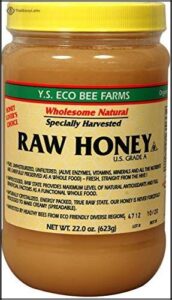
While honey has been used for centuries as a natural skin remedy, YS Eco Bee Farms Raw Honey stands out for its exceptional quality and thick, creamy texture.
This U.S. Grade A honey works wonders as an acne-fighting mask thanks to its antibacterial properties.
You’ll get 30 servings from the 22oz jar, making it great value for regular face treatments.
Mix it with a dash of cinnamon or turmeric for an enhanced anti-inflammatory effect.
Just remember – keep this sweet remedy away from infants under one year old.
Best For: Those seeking a high-quality, raw honey for skincare, culinary uses, or soothing sore throats.
- Thick, creamy texture ideal for skincare and culinary applications.
- Large 22oz jar provides excellent value for money.
- High-quality, U.S. Grade A honey with a rich, sweet flavor.
- Not suitable for infants under one year old.
- May not be suitable for those with specific honey allergies.
- Availability might be limited depending on location.
How to Use a Face Mask for Acne
Using a face mask for acne isn’t complicated, but it works best with the right prep and timing.
Pick a mask that matches your skin type.
Apply it to clean skin, and let it work its magic without overdoing it.
Preparing Your Skin and Applying The Mask
Before using natural face masks for acne, cleanse your skin with a gentle cleanser to remove dirt and oil.
Lightly exfoliate to clear dead skin for better mask absorption.
Apply the mask evenly, avoiding eyes and lips.
Let it sit as directed, then remove with lukewarm water.
Choosing The Right Mask for Your Skin Type
Picking the right mask starts with knowing your skin type.
Understanding your skin’s needs, such as DIY face mask for dry skin, is key.
Sensitive skin masks should avoid harsh ingredients like lemon juice.
For oily skin solutions, go for charcoal or clay to control shine.
Dry skin remedies need hydrating elements like honey.
Combination skin care benefits from balancing masks.
The wrong choice impacts results, so match the mask to your needs!
Frequency and Duration of Mask Application
Finding the right fit for your face masks is only half the battle—the real magic happens in how often you use them.
Overdoing it can irritate your skin, so stick with these guidelines: For effective acne treatment, try combining these routines with products from a reputable natural acne mask store like Natural Acne Mask Solutions.
- Oily skin: 2-3 times weekly.
- Dry or sensitive skin: 1-2 times weekly.
- Application time: 10-20 minutes max.
- Watch for reactions: Redness or itching means it’s time for a break.
Additional Tips for Managing Acne
Beyond face masks, remember that keeping your hands off your face is essential to prevent spreading bacteria.
For best results, combine these masks with a consistent skincare routine, a healthy diet, and maybe even a chat with a dermatologist if your acne’s really stubborn.
Maintaining Skin Hygiene and Avoiding Touching
After using a natural acne face mask, keep your skin clear by washing your face twice daily with a gentle cleanser.
Clean hands are non-negotiable—avoid touching your face to prevent spreading bacteria.
Swap pillowcases often and stick to fresh towel hygiene for drying your face.
These small steps, paired with consistent skin care, keep acne at bay.
Using Acne-Specific Skincare and Dietary Changes
Keeping your hands off your face is step one, but pairing that discipline with smart skincare and food choices seals the deal.
For example, reducing dairy intake, as suggested by research on the impact of dairy on acne, can substantially improve results.
Build a skincare routine for acne-prone skin with:
- Product reviews to pick acne-specific cleansers and moisturizers.
- Natural remedies like tea tree oil or salicylic acid.
- A diet trimming sugar and dairy; it improves acne treatment outcomes.
Considering Professional Help for Severe Acne
Sometimes, severe acne just won’t budge, even with the best face masks or natural remedies.
This is where dermatologist visits shine, and having the right dermatologist-recommended products for acne, such as those found at dermatologist acne treatments, can make a big difference.
Professionals can offer severe acne treatments like prescription treatments, laser therapy, or extractions.
It might seem expensive upfront, but consider a cost comparison—pro advice often saves money by cutting out trial and error.
Don’t ignore stubborn acne; tackle it head-on.
Frequently Asked Questions (FAQs)
Does a natural face mask work for acne?
It’s no magic wand, but natural face masks can help with acne.
Ingredients like honey, aloe vera, or clay soothe inflammation, reduce oil, and fight bacteria.
Remember, consistency works wonders, not overnight miracles!
What is a good DIY face mask for acne?
Try a simple mask: mix one tablespoon plain yogurt with a teaspoon of honey.
Apply, let it dry, then rinse.
This soothing mix combats acne-causing bacteria.
It’s a great starting point!
Can oatmeal be used in homemade acne face masks?
Oatmeal works wonders in acne face masks by soothing irritated skin and absorbing excess oil.
Its gentle exfoliation clears pores without harshness.
Mix it with honey or yogurt for a simple, calming mask you’ll love.
What is the best homemade face mask for pimples?
Honey and cinnamon make a great homemade mask for pimples. Honey soothes inflammation, while cinnamon fights bacteria. Mix 2 tablespoons of honey with 1 teaspoon of cinnamon, apply for 15 minutes, then rinse.
What is a good face mask for oily skin?
Picture your skin feeling fresh, not slick.
Clay masks like bentonite or kaolin soak up oil and unclog pores like pros.
Add a scoop of charcoal or tea tree oil for an extra acne-fighting kick.
What are some alternatives to acne face masks?
Try spot treatments with tea tree oil or benzoyl peroxide for targeted care.
Stick to a consistent skincare routine with gentle cleansers and non-comedogenic moisturizers.
You can also exfoliate weekly with salicylic acid to prevent clogged pores.
What homemade face mask is best for acne?
Mix 1 tablespoon of honey with 1/2 teaspoon of turmeric powder, and apply it to your face for 15 minutes. It fights acne with anti-bacterial properties while soothing redness and inflammation naturally.
Which face mask is the best for acne?
The best face mask for acne depends on your skin type.
For natural options, try an aloe vera and honey mask for soothing,
or a clay and tea tree oil mask to control oil and fight bacteria.
What is the best natural mask for the face?
For glowing skin, try a honey mask! It’s super hydrating. Alternatively, a simple oatmeal mask soothes irritation. Your skin will thank you!
Which Korean face mask is best for acne?
If you’re battling acne, the Dr. Jart+ Dermask Micro Jet Clearing Solution might be your MVP.
This Korean sheet mask uses salicylic acid and niacinamide to tackle breakouts and calm your skin effectively.
Conclusion
Did you know around 85% of people experience acne at some point?
Using the best natural face masks for acne can make a real difference in calming breakouts and improving your skin over time.
From honey to bentonite clay, these powerhouse ingredients tackle oil, bacteria, and inflammation without harsh chemicals. Give these DIY masks a try, stay consistent, and watch your skin transform. Small, simple changes often lead to big results—your skin will thank you! best natural face masks

